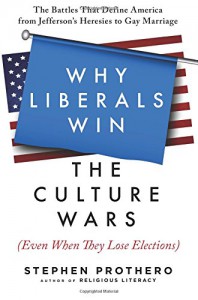Playing the Long Game

Prothero places the recent U.S. culture wars about gay marriage and abortion in a historical context of past American culture wars. He is careful to qualify his analysis to admit that there are many other factors involved in this events beyond religion and morality, but his does show an ongoing conservative vs. progressive cultural conflict going back to colonial times. His thesis is that while conservatives often win short term victories, in the long term the progressive agenda always comes out on top.
Prothero first looks at the 1800 election of Thomas Jefferson. Because of Jefferson's reluctance to publicly discuss his religious beliefs many religious leaders took advantage of his silence to denounce Jefferson as a closet atheist or even a "Mohammedan." He goes on to look at the anti-Catholicism movement that started in the 1830's and the anti-Mormonism movement of the 1850's. Catholics are so throughly integrated into American society today that it is hard to believe there was a time when they were treated with the same hostility as Communists were in the 20th century. Anti-Catholicism was as much anti-immigrant as it was a religious movement, but it and anti-Mormonism reflect the conservative tendency to fear change and fight against a loss of cultural dominance. Finally he looks at the Prohibition movement that successfully outlawed the sale of alcohol in the U.S. from 1920 - 1933. This may have been the last time that a morals crusade grew into a big enough national movement to impose its will on the general public.
It is hard to argue with Prothero's thesis that progressives tend to prevail in the long term. He could have expanded the argument to include Abolition, labor movements, the Civil Rights movement, and women's rights as well, but while those were long term progressive victories the conservative opposition was less focused on morality, so they would be a bit beyond the scope of Prothero's argument.



